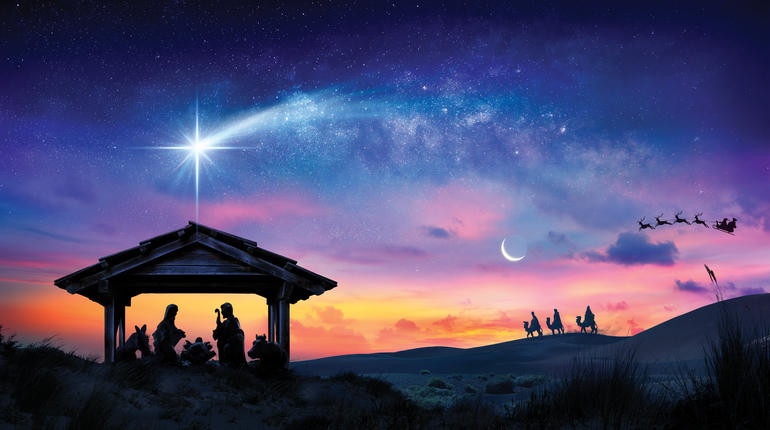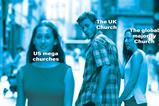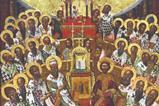Christmas is coming! And with it the usual stories telling us that the festival has pagan origins. But is it true? Nick Page investigates

Many Christians have reservations when it comes to Christmas. Yes, it’s a traditional Christian festival; yes, it’s all about the Son of God coming to earth, but it comes, like the Magi, with a lot of baggage.
I mean, there’s the commercialism and the overconsumption. There are all those daft carols about donkeys, little drummer boys and three kings apparently arriving in Bethlehem by boat. There’s the fact that Santa now seems to have top-billing over Jesus.
In recent years there are other causes for concern. Christmas, it is claimed, is not even a proper Christian festival. It’s the pagan winter solstice festival, don’t you know? And what’s more, those Christians simply parked the birth of Jesus on top of an ancient Roman festival. And don’t even get me started on how Christmas trees originate in pagan shrines to Odin, or some other Norse gods.
Well, I can’t do much to help with the commercialism or the carols, but the pagan claims? Those I have been looking into. And the good news is that they are, to use the language of Christmas, complete and utter baubles.
In the bleak midwinter
Christmas, the more observant among you will have noticed, occurs at a very dark time of year. Close to the winter solstice, in fact, when the days are at their shortest. Which is why some claim that the festival is really just a pagan winter solstice festival with added Jesus.
It’s certainly true that human beings have a long history of midwinter celebrations, but that’s not a particularly pagan thing: midwinter celebrations are found in many major religions, and all around the world. The ancient Egyptians celebrated the Feast of Isis, who gave birth to Horus, god of the sun. In Mesopotamia the festival of Tammuz commemorated the death and resurrection of the god of vegetation. From the second century BC comes the Jewish festival of Hannukah – the festival of lights, which celebrates the rededication, or ‘rebirth’, of the Jewish temple. And no doubt many other festivals have been lost to time, going right back into the mists of history, to when a group of humans, dressed in furs, looked around them at the darkness and said (to translate): “Chuffin’ heck, I’m cold.”
My point is this: midwinter festivals aren’t the property of any religion, whether pagan, Christian, Jewish, Hindu or atheist. We need festivals at this time not because we’re pagan, but because we’re human. In the darkness all of us need hope, light, love. Deep down, we are all afraid of the dark.
So, no doubt, when the Christians were deciding when to celebrate the birth of Christ, it made sense to put it at this time. Because it’s all about those things: darkness and light, the joy of new life, a star in the night sky, the idea that peace on earth might actually be possible. And remember the Church did have to choose a date for it, because it’s not like anyone had a copy of Jesus’ birth certificate.
Happy Birthday to you
The early Church didn’t bother much with Christmas. For one thing, the birth of Christ was only mentioned in two of the four Gospels. And there were three other significant reasons why celebrating his birthday was not high on their agenda. First, Jesus’ death and resurrection was considered far more important. Second, birthdays weren’t seen as that significant. Finally, nobody actually knew when the date was.
Christians were resurrection people. The most important Christian festival – and the one which was celebrated from the very earliest days of Christianity – was Easter (or Pascha, as they called it, the name adopted from the Jewish Passover). Christians would keep awake and watch all night on the eve of Easter, and celebrate with a dawn mass. As time went on, other events were added: the Jewish feast of Pentecost, the 40 days of Lent and special days allocated to commemorate the deaths of various martyrs.
More than that, there were reservations about the very idea of birthday celebrations. The early Christian writer Origen (c 185–254) dismissed birthdays as something only celebrated by tyrants like Pharaoh and Herod Antipas. Origen concluded that “Only sinners rejoice over this kind of birthday”, and that “The worthless man who loves things connected with birth keeps birthday festivals.” Birthdays were something that pagans celebrated, not Christians.
All the Bible says about the time of year of Jesus’ birth was that it was during the reign of Herod the Great and at a time when shepherds were in the fields with their flocks (which meant any date March to November, basically). Nevertheless, people speculated: Clement of Alexandria wrote that some believed 20 May was the day, others the 19 or 20 April, while he preferred 18 November. Some went for late March.
So, for the first 300 years, no one seems to have celebrated the birth at all.
Things changed in the early 300s. By then there was another festival – Epiphany – which was linked to Jesus’ birth and celebrated in the eastern parts of the Roman empire on 6 January. In Rome, however, they didn’t go in for all that Epiphany stuff. They decided that they wanted a festival of their own, and the date they chose was 25 December. Which is where all the “you nicked this off the pagans” stuff starts to kick in.
Here comes the sun
Here’s the story that you will see in most history books about Christmas – not to mention websites, encyclopaedia entries, newspaper articles, borderline-psychotic blogposts, etc. The theory goes that Roman Christians chose the 25 December as the day of Jesus’ birth because there was already a popular festival on the same day – the festival of Sol Invictus Natali, or the birth of the unconquered sun. Basically, those sneaky Christians moved in, took over the existing holiday, called it Christmas and made everyone go to church and wear special Christmas togas. They liked the symbolism of the sun – which was often used of Jesus – so it made perfect sense.
This behaviour is even admitted by one of their own, a Christian writer, the ‘Scriptor Syrus’, who wrote that “it was a custom of the pagans to celebrate on the same December 25 the birthday of the sun, at which they kindled lights in token of festivity…Accordingly, when the church authorities perceived that the Christians had a leaning to this festival, they took counsel and resolved that the true Nativity should be solemnised on that day.”
That looks pretty conclusive. But it all rests on a mix of false assumptions, dodgy history and a failure to look at what the original sources actually say.
Although 25 December was the winter solstice in the Roman calendar, there’s no evidence that it was a major Roman festival before the mid- 350s. As the early Church historian Andrew McGowan puts it: “The solstice did fall on December 25, but the idea of a major sun feast on that day before the Christian incarnation feast [ie Christmas] was established is probably a fantasy.”
And the mysterious source – the ‘Scriptor Syrus’ – doesn’t exist. The phrase just means ‘a Syrian writer’. Not only that, this anonymous writer was writing much later – some time in the late 1100s, some 800 years after the event. Before him, nobody had ever mentioned that Christians hijacked this festival. The first person to quote this passage appears to be a German scholar in 1833. But today you will find this given as proof everywhere of how those cunning Christians took over a pagan festival.
The truth is this: the first mention of Christians in Rome celebrating the birth of Jesus on 25 December comes from a document written in AD 354. The first mention of pagans in Rome celebrating the festival of the unconquered sun on 25 December comes from…err…AD 354. From exactly the same document.
So there is no evidence at all that Roman pagans got there first. It’s a complete misreading of the evidence.
As to why the Christians in Rome chose the 25 December, well, there are theories about that, but I haven’t got space here to go into all the details – and, frankly, I’ve got a book to flog. But the claim that Christians hijacked the pagan festival is nonsense. It’s just as likely that the pagans in Rome were copying the Christians, whose religion was growing ever more popular. As Church historian Diarmaid MacCulloch says: “It could be that as Christianity spread, and became a threat, anxious Roman emperors actually encouraged non-Christian festivals that could balance out what the Christians were doing.”
Oh Tannenbaum
So. It’s not a solstice festival. It’s not a hijacked Roman pagan celebration. What about some of the other stuff? What about the trees and the greenery and all that?
There is certainly evidence that Romans decorated their houses with greenery during some of their winter festivals, and some of the early Christians appear to have followed suit. In the fourth Century St Ephrem the Syrian reported that Christians decorated their houses with wreaths for Epiphany. By the 17th century, decorating churches was so widespread that there was actually a liturgical order of greenery for the Church year. (The Christmas plants were rosemary, bay and holly.)
Some greenery does have superstitious elements attached to it. In times where people had a rudimentary understanding of medicine, plants were thought to ward off evil spirits, or disease, or witches, or medieval double-glazing salesman. And these superstitions have long lives. As late as 1893 The Lady magazine was reporting that “our West Country girls have a pretty custom of trimming their beds with holly on Christmas Eve. They say the evil spirits will harm them if they omit this Christmas ceremony.” I would have thought putting holly in your bed was more likely to harm you than the evil spirits, but there you go.
But there’s a simpler reason for decorating your house with greenery: it looks nice.
As for Christmas trees, once again, there are those who will insist on claiming that putting up a Christmas tree is actually a throwback to a time when a lot of hairy pagans did unspeakable things in forests. Once again, complete baubles. A look into the history shows us that things like Christmas trees have surprisingly strong Christian roots (see what I did there?). The most likely case is that Christmas trees originate from the 14th and 15th centuries. The 24 December was celebrated as Adam and Eve’s day and was a time when plays on biblical subjects were performed by local guilds. Now, if you’re going to do a play about Adam and Eve, you need a tree. So in many cities, ‘Paradise Trees’ were not only put on stage, but also paraded through the streets by the actors beforehand. Since fruit trees in leaf were hard to come by in December, evergreen conifers were used, with apples tied to them (and communion wafers as well). Even after the plays stopped being performed, the paradise trees continued, this time adorned with apples and in people’s houses. As late as the latter part of the 19th century, Germans were still putting figures of Adam and Eve and the serpent under the ‘Tree of Life’ in their living space. Which means that if we’re going to play the mythical origins game, then really, when you are putting a Christmas tree in your house, you are celebrating Adam and Eve. And that tinsel that you have wound around the branches so tightly? That’ll be a snake, then.
Wrapping up
The point is, there is no reason for Christians to be ambivalent about Christmas. Yes, it’s overindulgent and over-the-top. Yes, it tempts people into spending money they can ill afford. But it is, still, about light in the darkness.
And this year – especially this year – we really need some light. This year, more than ever, we Christians need to celebrate Christmas and share the true meaning. We may not be able to do it in the traditional ways (although don’t worry, the Christmas carol service only started in Victorian times), but that won’t matter. Christmas was, from the start, an invented festival. That doesn’t diminish its power. All traditions have to start somewhere. And whatever it will look like this year, the core meaning remains. It’s about light overcoming the darkness and warmth driving out cold. It’s about life returning to the earth and to all who live on it. It’s about faith, friendship, families and even fir trees.
For all the theories about the origins of Christmas, the claims and counter-claims, the misrepresentations and the mysteries, Jesus remains at the heart of the festival. Christians were right to place his festival on that day, whatever the reason they chose to do it. He is the star, in every sense.
That’s what I think, at any rate. You, of course, might think it’s a load of utter baubles.






































